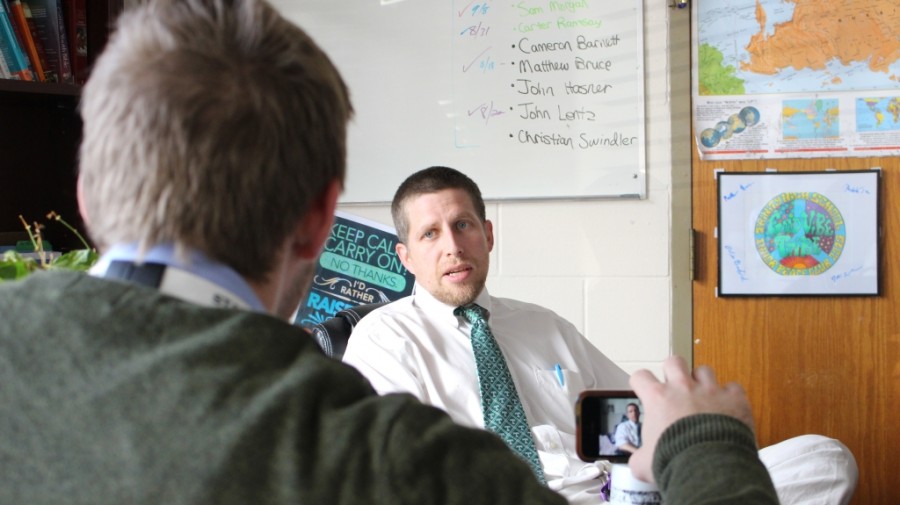The Fight for Gender Equity Continues
Trinity teacher Mr. Scott Holzknecht talks about gender equity.
October 22, 2015
The issue of equal rights for women has been debated over the last century and a half, beginning, of course, with the suffragettes. A film coming out Oct. 23 stars Meryl Streep as Emmeline Pankhurst, the first female leader in British politics and leader of the women’s rebellion in England, and Helena Bonham Carter as Edith New.
So, where are modern-day suffragettes, women continuing to remind the world that gender equity is an ongoing struggle? Well, they’re all around us. They’re in the military, in the work force and at rallies, some choosing to fight for their cause by going topless.
It’s only been recently that women were allowed to enlist in the Army as soldiers. The earliest year women were allowed to join the Army was 1917, but only as nurses. In World War II, however, more women were allowed to join. They also joined the work force, taking on jobs men would usually have, such as being a mechanic or an engineer.
But the Gulf War brought about an amazing growth of women fighting in the Marines, Army and Navy. Numbers reached more than 40,000, doubling since World War II. As of now, 15 percent of the armed forces are women.
Lt. Colonel Sheryl Murphy of the United States Air Force had a lot to say on the matter of women’s rights in the military. She said the main issue regarding women in the military is discrimination.
“Back in the late ’90s, after I had graduated college, I joined the Air Force,” Murphy said. “After I graduated, my friend called me and said, ‘Kudos to you, Sheryl. I don’t know if you know this, but your flight commander sat all of the instructors down and said, ‘This (blank) will not fly fighters over my dead body.’ So that was an eye-opener to me; however, this was in the ’90s, and it (discrimination) isn’t nearly as prevalent as it was.”
Gender inequity also occurs in the business world. Katy Miller, who works in the marketing department of the retirement company Atria, does not hesitate to declare the necessity for equal treatment.
“I am an equalist. I believe that men and women should be equal,” said Miller, who raises her daughter, Rosie, to understand the importance of equality.
She said, “I’ve raised Rosie on the feminist view. I’ve told her she can be anything she wants as long as she works hard at it. I hope that in the future things get better for her.”
What Miller mostly finds to be a problem is the wage gap. In 2015 there is a 16 cent on the dollar pay gap in favor of men. This shows progress because in 1980 the gap was 36 cents.
Some young women today see a problem with the way women are objectified and sexualized. Zoë Brohm, a senior at St. Francis High School in downtown Louisville, recently organized with Nan Elpers the Free The Nipple march that took place in early September. More than 100 people took part in the rally.
“It was originally Nan’s idea. She just asked me and I said, ‘Yes, of course, yes!'” Brohm said.
Brohm’s motive for the movement is clear: the double standard regarding censorship of the female body. The movement was started by filmmaker Lina Esco.
Rally participant Savannah Latto said, “I didn’t really know what to think of it at first, but once I started researching the topic a little more and found out about arrests for breastfeeding in public, I was outraged.”
It wasn’t just women who showed up for the rally. Both genders showed up to demonstrate that all are equal. The purpose behind fighting for equal rights does not include criticizing or shaming men, according to Latto. “I don’t see that as feminism,” she said.”If you shame men, you are not a feminist (equalist). In fact, you’re just as bad as those who discriminate.”
The various forms of discrimination these women have faced have not been easily forgotten.
“The most recent catcall was me standing on Broadway and being asked how much I was,'” Brohm recalled. “When I was 12, I got catcalled. I was surprised because I was walking with my parents.”
All of the women said they have been catcalled at least once.
Latto said, “It’s crazy that you ask that, because nothing comes to mind, but then I remember ‘Oh yeah! I’ve been catcalled’ and other things I’m numb to.”
The women recalled times when they were discriminated against in their lines of work. Latto said, “I worked at a fast-food restaurant, and I was a hard worker, but I would go home first. I was also the only girl who worked there. I look back on it now and think that it might have been because of me being a woman.”
Murphy said, “We have a commander in our upper echelon who will not promote women. He told my direct commander that he would would not promote me based on the fact that I am a woman.”
Miller said, “Men have a very outdated look on women.”
The Suffragette Movement began 150 years ago, and it’s still going on today. Is more work needed?
Miller, Brohm, Latto and Murphy say yes.
Check out Jack Tompkins’ interview with Trinity teacher Mr. Scott Holzknecht:



Sam Schafer • Oct 23, 2015 at 4:55 pm
Great piece Forde! Keep up the good work!